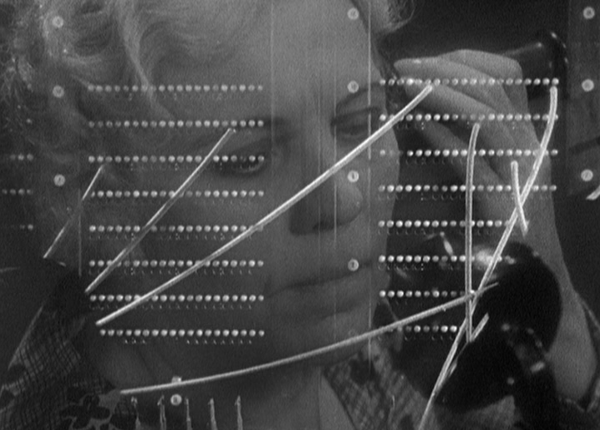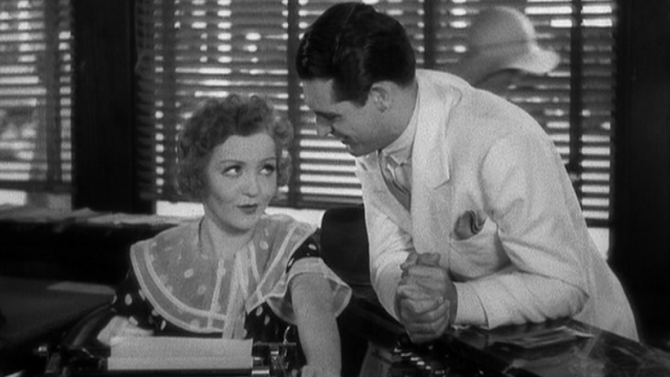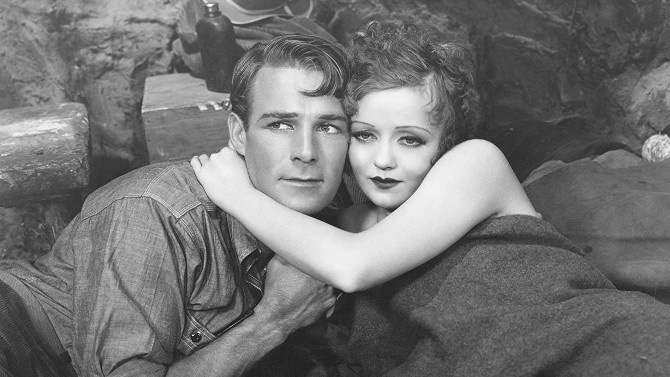A film that gives you an excellent idea of how partying has changed, and not, 1932’s Hot Saturday, directed by William A. Seiter, is an American pre-Code motion picture that pushed the moral boundaries of the time, or as the tagline put it, “They called me ‘BAD’_ So I tried to live up to my name!”.
Following Ruth Brock (Nancy Carroll) , she is a young bank teller, a working girl and morally-minded flirt – loving daughter of a cigar smoking ne-er-do-well (William Collier Sr.) and a taskmaster of a mother (Jane Darwell). Living in the little locale of Maryville, it is an example of gossipy, small-town America.
Working for the weekend, the youths of Maryville collect their paychecks, return most to their parents, and then borrow the family car to head out into the country to party all Saturday, making it the hottest day of the week. . . though, like all respectable people, they must tread carefully, for if they cross that ‘proper’ line drawn in the sand, there is no coming back in the minds of their powerful elders.
With all of the men infatuated with Ruth, she is constantly pursued, including by the community’s wealthy playboy, Romer Sheffield (Cary Grant) – a cocksman surrounded by scandal. Already in a relationship, every time he enters the bank he makes a point of flirting with Ruth, though ever the good girl, she stays busy at her desk.
Planning their next shindig, Sheffield invites Conny (Edward Woods), who has finally convinced Ruth to spend a Saturday with him, and his crew out to his home – a posh, waterfront pad that has everything you could want – a motorboat, giant modern home, private paths, stunning views, and. . . alcohol – a prized commodity when you are used to lousy bathtub gin (after all, this is shot during the Prohibition era).
Yet soon, the gang head out, returning to their favourite spot, Willow Grove, a high end dance club with flashing lights, sultry singers, romantic dancing, and private boat rides. . . Conny convincing his date to join him for a moonlight cruise. Pushing his luck, Ruth rejects his advances, the jerk leaving her to walk home from somewhere on the other side of the lake.

This clever shot displays the rumours swirling as the switchboard operator connects calls throughout town
She eventually makes it back to Sheffield’s place, and the man is nice enough to have his driver bring her home. . . the spurned Conny, and the bank executive’s daughter, Eva Randolph (Lilian Bond) – who spotted Ruth returning in his car, decide to spread rumours of her ‘supposed’ indecent behaviour.
While Ruth is away, her parents receive a letter that her childhood friend, Bill Fadden (Randolph Scott), is coming to visit (after seven long years) – the man is a conservative, bumbling geologist from a good family (from money). . . it has long been the couples’ dream that their daughter marry the well-suited man.
Now, with Ruth having lost her job due to the rumours (the latest scandal in town), she hopes to marry Bill before he gets word of it. Will Ruth be able to escape the slanderous rumours and find love with her returning childhood sweetheart? Will playboy Sheffield have anything to say about it? Is there any escaping the slanderous effects of vile gossip?
A film from Cary Grant’s first year in front of the camera (and his first role as a leading man), it is already evident here that the Brit has something special – suave, slick and smooth. . . this was before the man had truly made a name for himself (still somewhere between Archibald Leach and his famous Cary Grant persona – to which he himself described as, “Everyone wants to be Cary Grant. Even I want to be Cary Grant.”) Wearing a slick white suit and dark fedora, sometimes a flashy robe, at others, a posh sweater or traditional black tie, he is wholly believable as a polished gent who may have a respectable heart hidden somewhere beneath his playboy exterior. . . Grant working well with Carroll (who solidly portrays a woman who must deal with her fair share of problems), their playful chemistry evident.
It all seems like a foregone conclusion, but Grant was not even supposed to have this co-leading role. . . it was Gary Cooper who had been cast (Grant was supposed to have been childhood friend Bill Fadden), but, when the more established actor dropped out, Grant was bumped up – a moment of luck. Adding another level of meta to the story, Grant hit it off with Scott. . . the pair ended up living together (on and off) for twelve years, and, like in the film, rumours swirled about the two men – oh, how art imitates life and life imitates art.
A movie that would not have been made a few years later, Hot Saturday depicts small-town America as wholly judgmental, while Ruth’s mother’s reaction (not pity or caring for her daughter, but that of fear that it will ruin her chances of making good money) made it look like all people from these places cared about was the almighty dollar and their own reputation. Adding in a few shots of lingerie (perhaps the most evident, a scene in which Ruth pins her younger sister to her bed and removes her stolen panties from her person), some suggestive sexual themes, and depictions of alcoholic merrymaking, and you’ve got some controversy brewing (though the music, dancing and nightclubs have changed, partying sure hasn’t). So, don’t listen to the salacious rumours, marry this to an upcoming Saturday – and make it a hot one.


